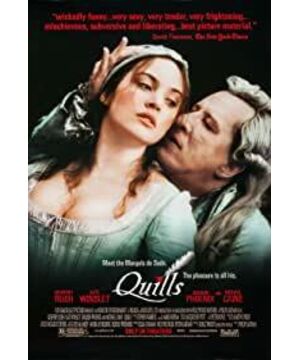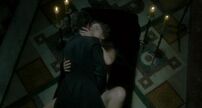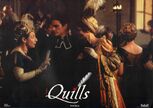This is a movie about a lunatic. Writing is a heartbeat for Sade, a must-do, much like an obsessive-compulsive disorder. It's just that this obsessive-compulsive patient chose a confrontational genre, with explicit descriptions of sexual matters (words, in my opinion, who were born in modern times, have no sense of beauty), metaphorical writing is confrontation. Gradually, he became deformed with this so-called confrontation with mainstream society. An aristocrat who rebels against the powerful and the sacred religion, a soldier with vested interests and its opposite, relies on a wealthy family to drink red wine and eat food in an insane asylum, and within the walls of the object, he subjectively builds a prison of so-called struggle for himself. Everyone is a tool to achieve anger for anger. The lunatics of the mental hospital, the laundress, the priest, the doctor, the normal spectators around him become the object of his ridicule, and the abnormal become his doll. The climax of self-satisfaction in contempt. Is writing the driving force of Sade's life? It would be better to say that angering others to satisfy one's self. Self-centeredness and arrogance put on the enormous energy of contempt and the art of writing, and self-indulgence does not satisfy Sade. For any individual, having the ability to influence others and having an unavoidable contagion to others is as if he has become a god or a demon himself. The washerwoman indulged in Sade's works, and gave her life to become the pen (or fantasizes herself as the sword of his struggle) of this talented man in her opinion; the doctor's little wife was opened by her husband. After the orifice of pleasure, he left the gorgeous stone palace and headed straight for the pleasure of the body, the germination of self-consciousness, the so-called side effect of awakening. In an era when religion rules everything, Sade feeds on awakening, because his victim mentality makes him wantonly attempt to trample all established morality, including reason.
Sade said the important thing is not right and wrong, but to hold up a mirror for people. You can like or dislike what you see, but it does exist. In a sense, every creator (narrator?) is doing the same thing, and the veiled and glorified truth should be reflected as a truth.
The priest told Sade that she was still a virgin. Sade collapsed in pain, and the priest laughed, "You're just a man." This is the irony that strikes me the most. Sade thought that the laundress who was indulging in his erotic works must also be a practitioner. When he learned of her unopened state on her body, he felt pity, admiration and deep regret. A man who uses sex as a weapon to fight against the orthodox world, in front of a woman whose body is still bound by God and bears thorns, falls in love with her the moment he learns the truth. The purity of the heart, in the unrestrained spiritual world, is still manifested as the most fundamental ill of a man. What could be more ridiculous than your own spear piercing your own shield? In my opinion, the director severely laughed at the men all over the world, including Thad.
Put up a mirror, look at the people around you, the world, and yourself.
Nobody is different.
View more about Quills reviews











